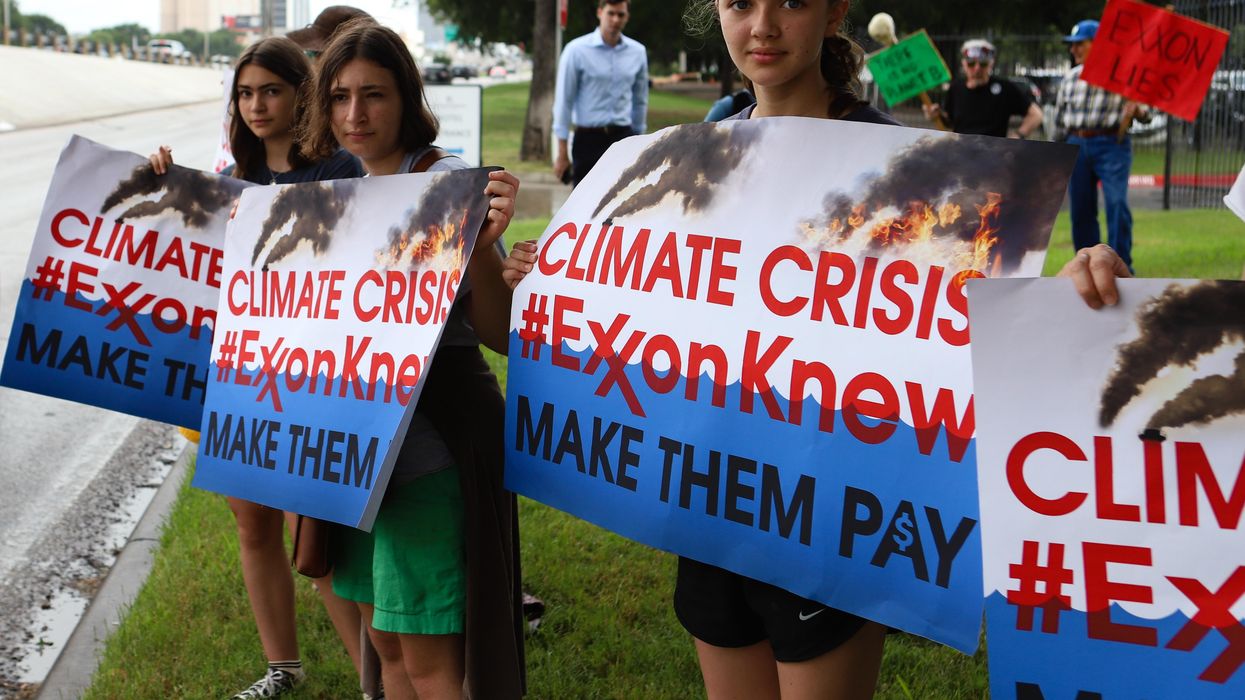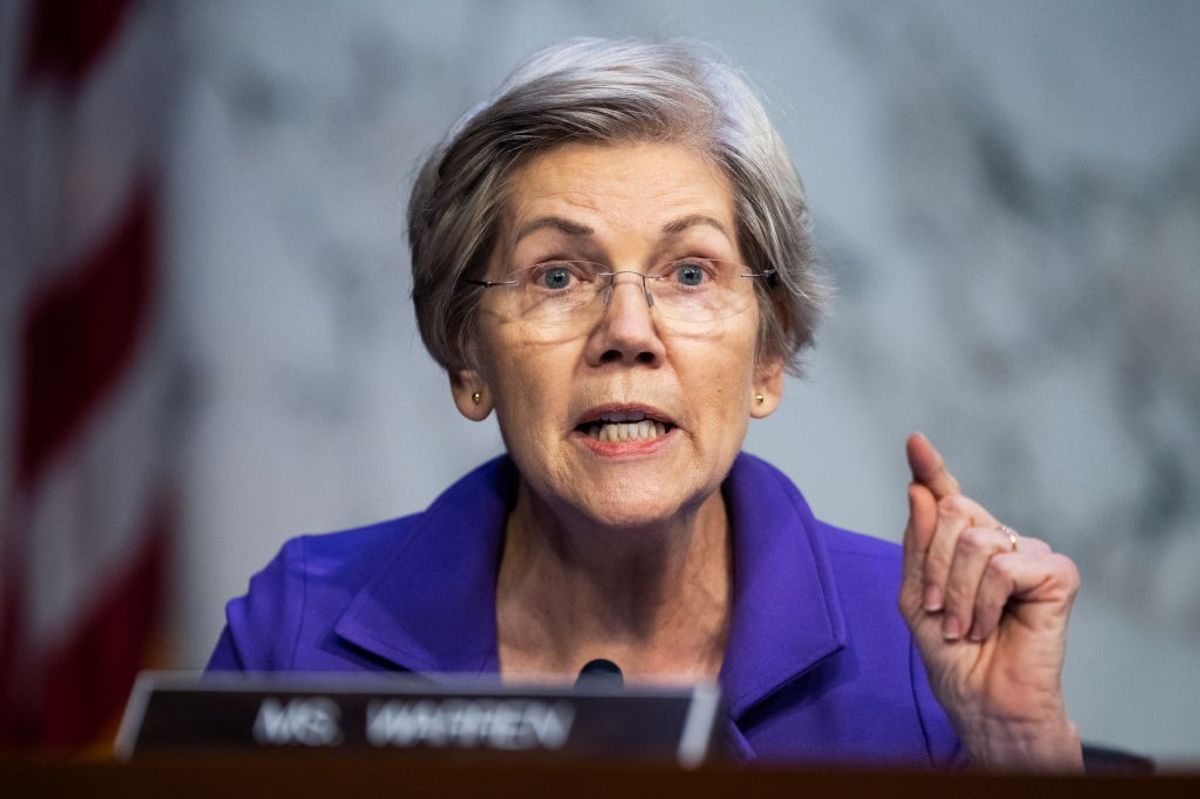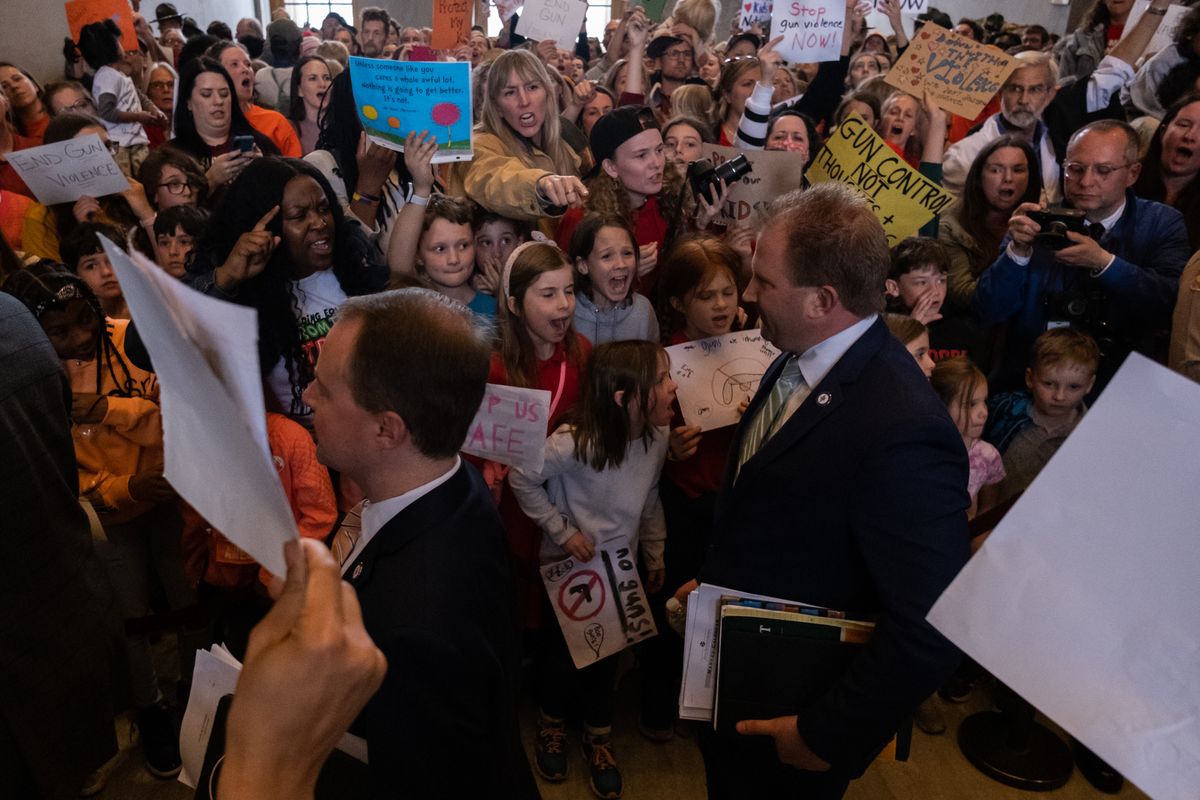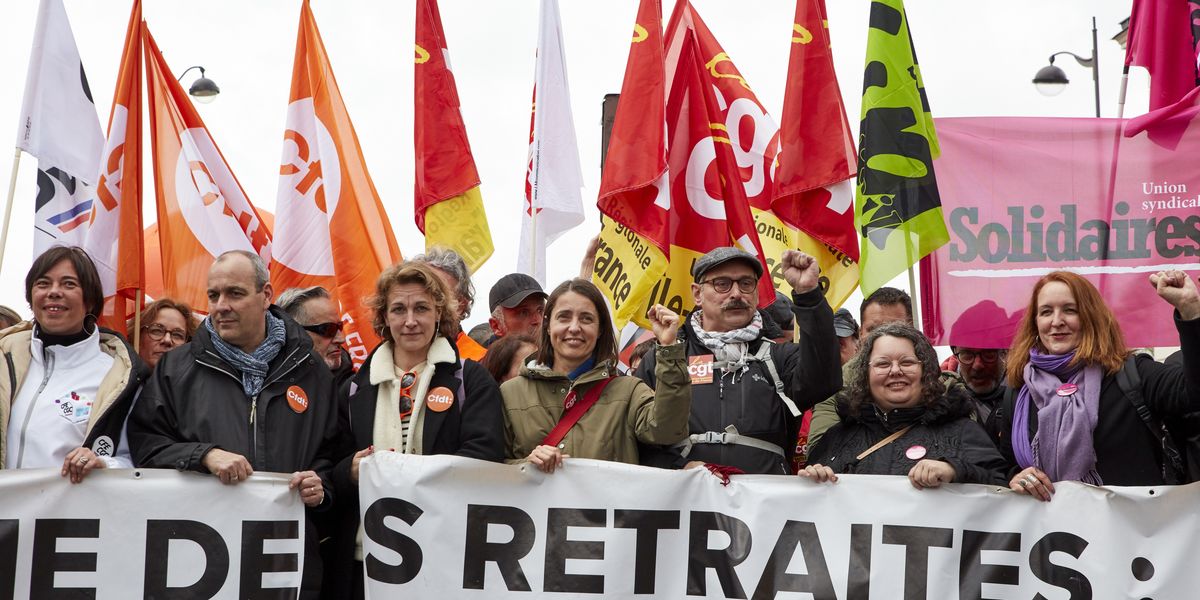This post was originally published on TAP : The American Prospect.
-
The Musk-damaged agency is unlikely to investigate whether Trump and his allies are profiting from advance knowledge about tariff changes or meme coin shenanigans.
-
The Democratic Party could spell this out clearly and consistently for voters.
This post was originally published on TAP : The American Prospect.
-
High-energy progressives can provide a compelling daily account of everything going wrong and coordinate opposition to the Trump-Musk nightmare.
This post was originally published on TAP : The American Prospect.
-
There’s mounting evidence that Donald Trump’s Treasury secretary is not telling the truth about DOGE’s infiltration of the federal payments system.
This post was originally published on TAP : The American Prospect.
-
The U.S. Forest Service is already underfunded and understaffed. Slashing its resources further is likely to unleash more severe wildfires.
This post was originally published on TAP : The American Prospect.
-
The right’s climate denial means higher prices.
This post was originally published on TAP : The American Prospect.
-
One year after the collapse of Silicon Valley Bank, Federal Reserve chair Jerome Powell is obstructing the finalization of tougher capital requirements for banks — and increasing the chances of more turbulence.
US Federal Reserve chair Jerome Powell speaking at a press conference in Washington, DC, on March 20, 2024. (Sha Hanting / China News Service / VCG via Getty Images) It’s been roughly a year since the collapse of Silicon Valley Bank (SVB), Signature Bank, and First Republic Bank — the second-, third-, and fourth-largest bank failures by assets in US history — and yet very little has changed. Not only did Federal Reserve chair Jerome Powell’s post-2016 regulatory rollbacks and supervisory blunders contribute significantly to the 2023 banking crisis, his current opposition to stronger capital requirements is setting the stage for the next crisis.
The number of banks on the Federal Deposit Insurance Corporation (FDIC)’s “Problem Bank List” grew by nearly 20 percent in the final quarter of 2023 (from forty-four to fifty-two), the largest uptick since the failure of SVB. In addition, credit card and commercial real estate loan delinquencies reached their highest level in nearly a decade, portending additional turmoil. Indeed, during his semiannual testimony before Congress a few weeks ago, Powell predicted that “there will be bank failures” generated by commercial real estate losses.
Despite that, Powell is actively hindering the Biden administration’s effort to strengthen capital requirements for approximately three dozen of the nation’s biggest banks. At issue are draft rules proposed in July by the Fed, FDIC, and Office of the Comptroller of the Currency (OCC) that would require banks with at least $100 billion in assets to increase their capital reserves to protect against losses.
Those rules, part of an international standard-setting process called Basel III Endgame (which sounds like the most boring Avengers movie yet), are designed to help prevent future financial crises. Powell, however, seems hell-bent on courting disaster. During the aforementioned congressional hearings held earlier this month — the same venue where he told lawmakers that trouble is brewing — Powell advocated for “broad, material changes” that would weaken the robust proposal he professed to support when it was unveiled last summer.
The Fed chair’s about-face marks a victory for the big banks that have been lobbying against a strong rule, backed by dozens of congressional Republicans and a few Democrats. Experts have called it the most intense fight against a proposed regulation since the Great Depression. As the American Prospect’s Robert Kuttner explained recently, Wall Street and its lawmaking allies claim that “higher bank capital standards will reduce lending and be bad for small businesses,” when in reality, “the standards would reduce bank speculative activities and modestly cut into exorbitant bank profits and executive bonuses.”
Notably, Powell has not ruled out re-proposing a watered-down framework, calling it a “very plausible option.” If he goes that route, it would almost certainly push the process into a new presidential administration. According to Powell, such a move may be necessary to achieve an outcome that has “broad support at the Fed and in the broader world.” Powell is now portraying that unattainable standard — as opposed to the 4-2 majority vote with which the original proposal passed — as tantamount to maintaining the Fed’s vaunted political independence.
But as historian Peter Conti-Brown, an expert on central banking and financial regulation, observed recently: “Throwing away regulatory reforms preferred by the party that won the last national election does not preserve Fed independence. It makes a mockery of it.” In threatening to thwart a proposal put forth by President Joe Biden’s Democratic appointees and initially approved with Powell’s support, Powell is simply “intervening in a way that Republicans and bankers prefer,” Conti-Brown noted.
The Fed chair’s timing is remarkable. On March 7, the same day Powell warned of impending bank failures, it was announced that the floundering New York Community Bancorp (NYCB) would receive a $1 billion cash infusion from a group of investors led by Donald Trump’s former Treasury secretary, Steven Mnuchin. But as Kuttner wrote, “more capital was needed before the bank’s speculative tailspin, not after.” Ironically, because NYCB’s recent acquisitions pushed its total assets above the $100 billion threshold, the bank “would have had to proceed more prudently . . . had a stronger capital rule been in effect,” Kuttner pointed out.
It remains to be seen if Mnuchin et al.’s privately organized buyout will save NYCB and at what cost to ordinary people, but what’s clear is that “if Powell succeeds in eviscerating the capital rule, there will be more public bank bailouts,” Kuttner added.
Powell’s opposition to stronger capital requirements, let alone better regulation, is especially galling considering that when my organization urged Biden not to reappoint Trump’s Fed chair, Powell’s supporters, including Matt Yglesias, insisted that the former private equity executive would defer to the Fed’s vice chair for supervision (VCS) on regulatory matters. The Revolving Door Project never bought this argument, and its wrongheadedness has only become clearer as Powell intensifies his campaign to sideline VCS Michael Barr on Basel III Endgame.
Many of Powell’s supporters were willing to overlook what should have been disqualifying ethical failures and regulatory weaknesses because they swore that he was a committed and uniquely capable dove on monetary policy. But that was also incorrect. The Fed chair has jacked up interest rates and kept them high despite ample evidence that rising prices are largely attributable to supply chain shocks and corporate profiteering amid the coronavirus pandemic, Russia’s invasion of Ukraine, and other crises, including climate change.
So while Powell’s elevated interest rates are undermining green investment and exacerbating the housing affordability crisis, along with other cost-of-living struggles such as credit card debt, his long-standing penchant for deregulation is also jeopardizing the stability of the financial system.
In effect, Biden’s unforced error vis-à-vis Powell is imperiling his reelection chances, not to mention US democracy and the planet’s health. If he gets another chance, Biden must nominate a central bank leader who will pursue whole-of-government responses to inequality, greenhouse gas pollution, and other elements of our worsening crises.
This post was originally published on Jacobin.
-
We need a democratic process for appointing leaders of regional Fed banks.
This post was originally published on TAP : The American Prospect.
-
Activists are pushing Fed vice chair Michael Barr and his deputy Kevin Stiroh to force the financial sector to take climate change seriously.
-
In advance of his Jackson Hole speech, the Fed chair has neglected his role of ensuring the safety and soundness of banks with substantial fossil fuel assets.
-
Algeria, Croatia, France, Greece, Italy, Portugal, Spain, Tunisia, and Turkey. What do these nine countries have in common? All of them are currently battling deadly infernos made worse by the fossil fuel-driven climate emergency. And yet, governments worldwide continue to greenlight new coal, oil, and gas production — exacerbating planet-heating pollution and ensuring that heatwaves, wildfires…
This post was originally published on Latest – Truthout.
-
Human rights advocates called for federal intervention Monday after it was reported that state troopers assigned to Republican Texas Gov. Greg Abbott’s border militarization initiative have been ordered to push migrant children back into the Rio Grande and to deny water to asylum-seekers amid a life-threatening heatwave. The exclusive reporting by Benjamin Wermund of the Houston Chronicle and the…
This post was originally published on Latest – Truthout.
-
A 2-1 split panel of the U.S. Court of Appeals for the Sixth Circuit ruled Saturday that Tennessee can enforce its ban on gender-affirming healthcare for minors — reversing a lower court’s preliminary injunction, ignoring the guidance of every major medical organization in the United States, and delivering a crushing blow to trans youth and their supporters. Last month, U.S.
This post was originally published on Latest – Truthout.
-
The Financial Times confirmed Friday that the Organization for Economic Cooperation and Development lobbied Australia to weaken a law that would have compelled about 2,500 highly profitable multinational corporations to reveal where they pay taxes, eliciting outrage from tax justice advocates. Citing two unnamed people familiar with the discussions, FT reported that the Paris-based club of wealthy…
-
An independent weapons watchdog on Thursday implored the Biden administration to abandon any plans it has to provide the Ukrainian government with cluster bombs. While the White House has yet to finalize its decision, the State Department is expected to invoke a waiver under U.S. arms export laws that would allow stockpiled cluster munitions to be transferred to Ukraine, which is currently waging…
-

This story originally appeared in Common Dreams on June 28, 2023. It is shared here with permission under a Creative Commons (CC BY-NC-ND 3.0) license.
Democratic Maine Gov. Janet Mills on Monday vetoed an offshore wind development bill because she opposed an amendment requiring collective bargaining agreements for future projects, drawing condemnation from the state’s largest federation of unions.
“Maine’s climate motto has been ‘Maine Won’t Wait.’ With this veto, Gov. Mills is saying, ‘Maine Will Wait’—for thousands of good jobs, for clean energy, and for the build-out of a new industry,” Maine AFL-CIO executive director Matt Schlobohm said in a statement. “We will wait because the governor is opposed to fair labor standards which are the industry norm.”
“The governor’s ideological opposition to strong labor standards,” said Schlobohm, “jeopardizes the build-out of this industry and all the climate, economic, and community benefits that come with it.”
Mills supported an earlier version of Legislative Document (L.D.) 1847 that originated from her office. Last week, however, the governor made clear that she opposed the addition of an amendment requiring project labor agreements (PLAs)—pre-hire deals negotiated between unions and employers that establish wage floors and other conditions—for the construction of offshore wind ports as well as the manufacturing of turbines and other components needed for wind energy projects.
In a letter to state lawmakers, “Mills argued that mandating a PLA would create a ‘chilling effect’ for non-union companies, discouraging them from bidding on construction,” The American Prospect‘s Lee Harris reported. “Supporters of the PLA provision say that is a far-fetched objection, since the agreements do not ban non-union contractors from vying for jobs. (In fact, that’s one reason some more radical unionists say PLAs do too little to advance labor’s cause.)”
The governor vowed to veto the bill unless the Legislature recalled it from her desk and revised it to the initial version or adopted “language that would ensure that union workers, employee-owned businesses, and small businesses could all benefit.”
“Maine’s climate motto has been ‘Maine Won’t Wait.’ With this veto, Gov. Mills is saying, ‘Maine Will Wait’—for thousands of good jobs, for clean energy, and for the build-out of a new industry.”
In a Friday letter to Mills, state lawmakers told the governor they would introduce “Maine Resident Priority Language” to encourage contractors to first hire qualified workers who reside in the state.
That last-ditch effort to save the bill was unsuccessful, however. On Monday, the final day of Maine’s legislative session, Mills vetoed L.D. 1847, just as the Maine State Chamber of Commerce had urged her to do.
In her veto letter, which repeated language from last week’s threat letter, Mills wrote, “Generally speaking, I recognize the value of PLAs, or collective bargaining agreements, as a tool to lift up working men and women by ensuring that they are paid strong wages with good benefits.”
However, as The Portland Press Herald reported, Mills contended that the legislation’s PLA requirement “was a step too far because more than 90% of workers in Maine’s construction industry—which would compete for these jobs—are not unionized.” The governor “also pointed out that no other New England state requires labor agreements for offshore wind development projects.”
Mills wrote that a PLA requirement “could stifle competition, which could cut out thousands of workers and employee-owned businesses, and could end up favoring out-of-state unions in the region, over Maine-based companies and workers—and I do not believe any of us want to see out-of-state workers being bussed up to coastal Maine to build our offshore wind port while Maine workers are sidelined, sitting at home.”
Jason Shedlock, president of the Maine Building and Construction Trades Council and an organizer for the Laborers’ International Union (LiUNA), told the Prospect: “Right now what we see is the opposite. People leave the state every day to go to other states in New England, to earn family-sustaining wages.”
According to Harris:
Maine’s Building Trades include more than 6,000 workers who routinely struggle to find work nearby.
The construction industry has always involved travel. But Shedlock says part of the case for a PLA is that it will grow Maine’s skilled apprentices and eventually its union halls. If non-union contractors win bids on jobs, he said, they will look to the building trades’ apprentice programs for staff.
Maine Sen. Chip Curry (D-11), the bill’s lead sponsor, said in a statement that he is “disappointed by the governor’s veto.”
It “threatens this new industry, putting good jobs for Maine people and the environmental benefits that go along with offshore wind at risk,” said Curry. “Maine voters understand the opportunity that we have, and they overwhelmingly support an offshore wind industry that guarantees workers good pay and benefits, protects our environment and host communities, and reduces our dependence on fossil fuels.”
“This is a critical issue for Maine’s future,” he added. “I remain committed to working with all parties, including Gov. Mills, to find a path forward.”
Earlier this month, the House voted 73-64 to pass L.D. 1847, and the Senate followed suit with a 22-11 vote. The former margin doesn’t meet the two-thirds threshold needed to override Mills’ veto, but the governor reiterated in her Monday letter to lawmakers that she is still committed to reaching a compromise.
According to Bangor Daily News, “Mills and progressives could come to a deal on the subject as part of a different bill on offshore wind procurement that the full Legislature has not yet acted upon.” That legislation, L.D. 1895, contains the same labor standards, and the governor has already threatened to veto it unless they are removed.
In an attempt to justify her opposition to PLA requirements, Mills warned that robust pro-worker provisions would put Maine “at a disadvantage compared to other New England states,” adding, “It is imperative that investment in offshore wind facilities and projects foster opportunities for Maine’s workforce and construction companies to compete on a level playing field for this work.”
But according to Schlobohm: “Every single one of the 16 offshore wind projects in development or permitting in the Northeast/East coast is being built under these exact labor standards. The same is true for offshore wind ports. It is the industry norm. Why would Maine lower our standards?”
“Funding from the federal government to support these projects is contingent on these exact labor standards,” he continued. “These bills embody the playbook—pushed by the Biden administration—for how we decarbonize in a way that benefits working people and creates a durable transition.”
The Maine Beacon reported Tuesday that Mills’ veto could cause Maine to miss out on millions of dollars in federal subsidies earmarked for offshore wind development.
“We would expect this type of resistance from a Republican governor,” Francis Eanes, executive director of the Maine Labor Climate Council, told The Washington Post. “But to have a Democratic governor impeding the president’s agenda is something that we just didn’t expect.”
As Harris explained: “At stake is whether the offshore wind industry will offer decent work—particularly compared with the industrial-scale solar sector, which promised good-paying careers but has delivered unpredictable temp jobs. In nearly every state, similar fights are playing out as business groups try to beat back labor provisions attached to new federal spending.”
“Labor groups across clean energy are hoping to capture not just installation but manufacturing jobs,” she continued. “Because operations management for offshore wind uses relatively little manpower, retaining the manufacturing is critical. In Scotland, recent reports suggest that heavy investment in offshore wind over the past decade has generated just one-tenth of the jobs promised by government officials, partly because the manufacturing of turbines has been offshored.”
-
Amazon on Friday fired Jennifer Bates, a warehouse worker and lead spokesperson of the unionization campaign in Bessemer, Alabama, without cause. The Retail, Wholesale, and Department Store Union (RWDSU) described Bates as the “woman who lit the spark of the current rise of labor activism.” Her termination comes as the National Labor Relations Board (NLRB) continues to investigate RWDSU’s claims…
This post was originally published on Latest – Truthout.
-
Economic justice advocates cried foul Thursday after the U.S. Senate passed legislation that aims to block President Joe Biden’s pending student debt cancellation plan and reverse already-delivered relief. Democratic Sens. Joe Manchin (W.Va.) and Jon Tester (Mont.), along with right-wing Independent Sen. Krysten Sinema (Ariz.), joined Senate Republicans in supporting H.J. Res. 45.
This post was originally published on Latest – Truthout.
-

To defeat the anti-Palestinian lobbying network that spends millions of dollars to help corporate Democrats beat left-leaning congressional candidates, progressives in the United States need not temper their criticism of Israel’s brutal occupation nor Washington’s role in subsidizing it, a pair of organizers wrote Monday in The Nation.
Alexandra Rojas and Waleed Shahid—respectively the executive director and communications director of Justice Democrats—argued that U.S. Rep. Summer Lee’s (D-Pa.) recent victory provides “a road map for how progressive Democrats can unite to build infrastructure to elect candidates whose values will be consistent both at home and abroad.”
Since the American Israel Public Affairs Committee (AIPAC) launched its super PAC, the United Democracy Project (UDP), in December 2021 as a way to legally contribute unlimited amounts of money to directly influence elections and counter mounting opposition to Israeli apartheid within the Democratic Party, the powerful anti-Palestinian lobbying group has not been shy about what journalist David Dayen calls its “perversion of the primary process.”
Last year, for instance, AIPAC boasted that its Republican billionaire-funded attack ads helped topple nearly 10 left-leaning Democrats in primary races, including Jewish Rep. Andy Levin (D-Mich.), former Rep. Donna Edwards (D-Md.), and progressive champions Nida Allam in North Carolina, Nina Turner in Ohio, and Jessica Cisneros in Texas.
“The AIPAC network is spending millions of dollars precisely because it is losing the generational and partisan battle to progressive Democrats.”
Despite AIPAC’s best efforts to beat Lee—UDP dropped more than $2.3 million to support her corporate-friendly opponent in last May’s Democratic primary and then invested substantial sums to help her Republican adversary Mike Doyle in November’s midterm—the pro-working-class advocate from Pittsburgh won both contests.
“The importance of Lee’s victory cannot be overstated,” Rojas and Shahid wrote Monday. “It is a recent and concrete example of how a strong candidate with a well-run, community-driven campaign and large progressive coalition can overcome AIPAC’s multimillion-dollar machine.”
But “as we head into another cycle of competitive Democratic primaries,” the pair warned that “some Democratic operatives are suggesting that prospective candidates just get ‘AIPAC’s target off their back’ by conceding to the anti-Palestinian spending network (made up of not just AIPAC but also Democratic Majority for Israel, Pro-Israel America, NORPAC, and others) through vague or overly conciliatory positions regarding the billions in largely unrestricted military aid that American taxpayers provide the Israeli military.”
According to Rojas and Shahid:
This view was summarized in one conference call last year in which a consultant suggested to a progressive candidate: “Why don’t you just tweet something about how you support Israel if you want to avoid $5 million in attack ads?” Missing from these short-term, tactical discussions about appeasing AIPAC are ideological, moral, and strategic questions regarding the Democratic Party’s position on a military occupation that leading Israeli and international human rights organizations like B’tselem, Amnesty International, and Human Rights Watch all call apartheid.
“Instead of capitulating,” the pair continued, “progressives should continue building off Lee’s victory by coordinating our own network of anti-occupation donors, operatives, and local community members on the ground—precisely mirroring the ideologically driven electoral infrastructure that the AIPAC network has already built.”
Rojas and Shahid argued that “the AIPAC network is spending millions of dollars precisely because it is losing the generational and partisan battle to progressive Democrats.”
\u201c”The AIPAC network is spending millions of dollars precisely because it is losing the generational and partisan battle to progressive Democrats.”\n\nExactly. And bullying Democrats with threats of massive spending is an admission that their anti-Palestinian agenda is unpopular.\u201d— Matt Duss (@Matt Duss) 1681131734“The AIPAC network’s multimillion-dollar spending operation to punish Democrats who stray even one step away from unconditional support for the Israeli occupation makes sense considering how politically untenable such stances would be otherwise,” Rojas and Shahid wrote. They pointed to a recent Gallup poll showing that for the first time, a majority of Democratic voters now sympathize with Palestinians more than with Israelis.
In addition, “as of 2019, 56% of Americans and 71% of Democrats said the United States should not ‘give unconditional financial and military assistance to Israel if the Israeli government continues to violate American policy on settlement expansion or West Bank annexation,’” the pair continued.
In February, far-right Israeli Prime Minister Benjamin Netanyahu’s administration retroactively authorized nine illegal settlements built without government approval in the occupied West Bank and East Jerusalem and announced its plans to erect even more. This elicited a rare rebuke from the United Nations Security Council, which said that “continuing Israeli settlement activities are dangerously imperiling the viability of the two-state solution based on the 1967 lines.”
Roughly 700,000 Israelis live in illegal settlements that have been built in the occupied West Bank and East Jerusalem since Israel violently seized those Palestinian territories, along with Gaza, in 1967. Because international law prohibits occupying forces from transferring their civilian population into occupied territories, a top U.N.-appointed expert has characterized Israeli settlements as a “war crime.”
“However, because of the massive political and financial power of the anti-Palestinian lobby, only 14% of Democrats in the House of Representatives have signed legislation to condition aid to Israel on ending the expansion of settlements,” Rojas and Shahid lamented. “If the AIPAC network can spend unlimited money to ensure that U.S. politicians don’t represent the generational shift in the Democratic Party and the evolving views of the American people, it will have nothing to worry about.”
Since Netanyahu returned to power at the end of last year, his increasingly exterminationist government has killed more than 80 Palestinians and is currently trying to overhaul the judiciary to give itself even more power. Nevertheless, the Biden administration has shown no interest in making Washington’s provision of $3.8 billion in annual military aid to Israel contingent on ending the unlawful annexation of Palestinian land as well as assaults on Palestinian residents.
“We must organize to align the preferences of Democratic legislators with the voters who elected them.”
According to Rojas and Shahid, “AIPAC’s aggressive entry into Democratic primaries signals the increasingly partisan track that the anti-Palestinian lobby is taking, mirroring Israel’s rightward shift and the Democratic disavowal of groups like the NRA and more recently, Big Oil.”
The pair continued:
In the last cycle, AIPAC backed over 100 insurrectionist-aligned Republicans, opposed Democrats in general elections and primaries, spent zero dollars against Republican candidates—and were largely funded by pro-Trump Republican donors Robert Kraft, Bernard Marcus, and Paul Singer. Given the generational shift taking place in the Democratic Party—led by Justice Democrats like Rashida Tlaib, Alexandria Ocasio-Cortez, Cori Bush, Jamaal Bowman, Summer Lee, and many others—it is clear that the extreme anti-Palestinian sentiment championed by AIPAC will increasingly fall along party lines, which is exactly what AIPAC’s multimillion-dollar spending seeks to avoid.
Just as with Medicare for All, the Green New Deal, or criminal justice reform, we must organize to align the preferences of Democratic legislators with the voters who elected them. It is through Congress, after all, that we have the power to ensure that American taxpayers are not funding the violation of human rights and subsidizing the endless occupation of the Palestinian people. AIPAC and its largely Republican donors know that Democrats who speak out about the occupation also make the party more progressive on a range of other issues.As political observers pointed out at the time, UDP’s intervention against Lee in the general election marked the first time the super PAC spent money to boost a Republican candidate over a Democratic one, giving the lie to AIPAC’s ostensible concerns about Lee and other progressives’ presumed lack of loyalty to the Democratic Party. Notably, AIPAC’s single-minded focus on suppressing criticism of Israeli colonialism led the group to endorse dozens of GOP extremists running for Congress last year, including election deniers, proponents of the racist “great replacement theory,” and QAnon adherents.
Rojas and Shahid’s argument echoed points made previously by Jewish democratic socialist Sen. Bernie Sanders (I-Vt.), who has been a vocal critic of AIPAC.
Last year, Sanders accused the group of bankrolling super PACs such as UDP “to buy elections and control this democracy.”
“Why would an organization go around criticizing someone like Summer Lee for not being a strong enough Democrat when they themselves have endorsed extreme right-wing Republicans?” Sanders asked. “They are doing everything they can to destroy the progressive movement in this country.”
In the words of Rojas and Shahid: “A progressive movement, and a Democratic Party that sells out Palestinians for an easy reelection, is not a movement that can be counted on to fight back for any community when they need us most. Our end goal is not winning for the sake of winning. It’s winning to bring about fundamental change.”
This post was originally published on Common Dreams.
-

To avert the worst consequences of the climate crisis, the world must stop building new coal plants and shut down existing ones at nearly five times the current rate.
That’s according to an analysis published Wednesday by Global Energy Monitor (GEM) and nearly a dozen other groups, including Reclaim Finance, the Sierra Club, and the Alliance for Climate Justice and Clean Energy.
GEM’s ninth annual survey of the world’s existing and proposed supply of coal-fired power—the largest single source of energy-related CO2 emissions—found that “outside China, the global coal pipeline is drying up,” albeit not at a quick enough pace.
“Urgent action is necessary to ensure an end to coal and a fighting chance at a livable climate.”
Seventeen countries retired a combined 26 GW of operating coal capacity in 2022. Meanwhile, 25 GW of operating coal capacity received an announced close-by date of 2030.
However, to meet the Paris agreement’s goal of limiting global warming to 1.5°C above preindustrial levels—beyond which the climate emergency’s impacts will grow even deadlier, especially for humanity’s poorest members who bear the least responsibility for the crisis—coal power must be phased out completely by 2040. To stay on track while giving developing countries extra time to switch to renewables, high-income countries in the Organization for Economic Cooperation and Development (OECD) must shutter their coal plants by 2030.
This “would require an average of 117 GW of retirements per year, or four-and-a-half times the capacity retired in 2022,” according to the report. “An average of 60 GW must come offline in OECD countries each year to meet their 2030 coal phaseout deadline, and for non-OECD countries, 91 GW each year for their 2040 deadline. Accounting for coal plants under construction and in consideration (537.1 GW) would require even steeper cuts.”
Lead author Flora Champenois, the project manager for GEM’s Global Coal Plant Tracker, said in a statement that “the transition away from existing and new coal isn’t happening fast enough to avoid climate chaos.”
“The more new projects come online, the steeper the cuts and commitments need to be in the future,” she noted.
Last year, the world added 45.5 GW of new coal capacity, meaning that the operating coal fleet grew by 19.5 GW overall.
“Fourteen countries commissioned new coal power in 2022,” the report notes. “More than half (59%) of the newly commissioned capacity was in China (25.2 GW), with a remaining 16% in South Asia (India, Pakistan, and Bangladesh), 11% in Southeast Asia (Vietnam, Philippines, Indonesia, and Cambodia), 9% in East Asia (Japan and South Korea), and 5% in other regions.”
Outside China, the global coal fleet continued to shrink in 2022 as planned projects were canceled and old plants closed. But coal retirements slowed down compared with previous years due in large part to Russia’s invasion of Ukraine, which sent gas prices soaring.
\u201c\ud83c\uddea\ud83c\uddfa retired only 2.2 GW last year after a record 14.6 GW, but coal is not making the comeback many expected from the energy crisis. The rebound in retirements in the next few years could make up for the lower than expected retirements in 2022.\u201d— Global Energy Monitor (@Global Energy Monitor) 1680739205“While coal under development—or coal in pre-construction and construction—has collapsed by two-thirds since the Paris agreement, nearly 350 GW of new capacity is still proposed across 33 countries, and an additional 192 GW of capacity is under construction,” the report notes. “China’s pre-construction and construction capacity surpassed the rest of the world’s in 2021, and the gap widened in 2022. New coal capacity under development in China increased by 38% (266 GW to 366 GW), while the capacity in the rest of the world decreased by 20% (214 GW to 172 GW). China now accounts for two-thirds (68%) of global capacity under development, up from 55% a year ago.”
Wednesday’s analysis follows the Intergovernmental Panel on Climate Change’s (IPCC) latest warning that burning existing fossil fuels will consume the world’s remaining “carbon budget,” or the maximum amount of planet-heating pollution compatible with preventing temperature rise from exceeding 1.5°C. The IPCC has made clear the need for “rapid and deep, and in most cases immediate greenhouse gas emission reductions.”
Upon the publication of the IPCC’s assessment two weeks ago, United Nations Secretary-General António Guterres outlined “an ‘Accelerated Agenda‘ renewing calls for an immediate end to new coal, and for a phaseout of existing coal by 2030 in developed countries and 2040 in the rest of the world,” GEM’s new report points out. “Under such a scenario, only 70% of OECD operating coal capacity is currently on pace (330 GW), and outside the OECD, only 6% of coal capacity has a known closure date before 2040 (93 GW).”
“Urgent action is necessary to ensure an end to coal and a fighting chance at a livable climate,” the report adds. “To accomplish this, countries need to translate announcements into plant-by-plant retirement plans as well as ramp up phaseout commitments. Details on how current and future policies and funds will be implemented to impact coal retirement dates and ensure a swift and equitable end to new coal will be essential.”
This post was originally published on Common Dreams.
-
Israeli police brutally attacked Palestinians inside the Al-Aqsa Mosque compound in occupied East Jerusalem on Tuesday night, injuring at least a dozen peaceful worshipers and arresting more than 400 during the Muslim holy month of Ramadan. “Dozens of heavily armed officers stormed the site, used stun grenades, and fired tear gas into the Qibli prayer hall — the building with the silver dome…
This post was originally published on Latest – Truthout.
-

Major League Baseball and recently unionized minor league players working for MLB team affiliates reached a tentative deal Wednesday on a historic first collective bargaining agreement.
The pending five-year contract is set to more than double the pay of athletes who currently receive poverty wages even though the average MLB team is worth more than $2 billion. It comes just months after the MLB Players Association, the union representing major leaguers, successfully organized highly exploited minor leaguers who are striving to join their ranks into a new collective bargaining unit.
“Nearly a decade of fighting has led to this, and players have achieved what was once thought undoable.”
MLB recognized the union’s minor league unit in September, paving the way for negotiations that wrapped up on the eve of opening day in the majors and two days before opening day in the minors.
Citing unnamed sources, ESPN‘s Jeff Passan reported Wednesday night:
After years of disillusionment among future major leaguers about paltry salaries forcing them to work offseason jobs—and coincidentally on the day a judge approved a $185 million settlement the league will pay players who accused it of violating minimum wage laws—the parties agreed on a deal that went out to a vote among the union’s rank and file and that will need to be approved by owners, as well, before it is formalized. The agreement could be announced officially as early as Friday, the first day of games in the minor leagues.
The deal was confirmed by numerous other reports citing league and union sources.
Unlike now, minor leaguers are set to be paid “for most of the offseason as well as spring training, including back pay for this season,” according to Passan. He detailed the annual pay increases on social media.
\u201cBREAKING: Minor league baseball players\u2014among the lowest earning workers in America, who are paid as little as $7/hour by billionaire MLB owners\u2014have reached a first union contract that would more than double the pay of all players.\u201d— More Perfect Union (@More Perfect Union) 1680143267In addition to pay hikes, players “emphasized better housing and transportation as a matter of import,” Passan reported. “Starting in 2024, those at Triple-A and Double-A will receive their own bedroom, and players with spouses and children will receive special accommodations. In rookie ball, Single-A, and High-A, teams will provide transportation to stadiums, where they’ll eat meals provided under rules negotiated by a joint clubhouse nutrition committee.”
As More Perfect Union detailed on social media, harsh living conditions on the road between games prompted players to organize for better accommodations and nutrition. Thanks to this effort, MLB began requiring its minor league teams to provide housing to players in 2022. The pending agreement seeks to secure additional improvements.
\u201cIn 2021, a courageous campaign by former and current players forced the league to start offering housing.\n\nhttps://t.co/Yqu2NIK8MR\u201d— More Perfect Union (@More Perfect Union) 1680143267While name, image, and likeness (NIL) rights are currently controlled by MLB, the pending agreement grants full NIL rights to the union, which can use them to strengthen group licensing deals. In addition, it expands players’ medical rights, including covering post-injury health expenses for a longer period of time.
“Among those not included in the deal are players at teams’ complexes in the Dominican Republic,” Passan reported. “The minor league unit of the MLBPA includes only players on teams’ domestic rosters—and players from the Dominican Republic, Venezuela, and other foreign countries will still reap the benefits when stateside.”
In a concession to owners, “the deal includes the reduction of the maximum Domestic Reserve List, which governs the number of players a team can roster outside of its Dominican Republic complexes, from 180 to 165 starting in 2024,” Passan noted. “The union had previously fought MLB’s efforts during the lockout last year to reduce the reserve list, which teams had identified as a priority.”
Nathan Kalman-Lamb, an assistant professor of sociology at the University of New Brunswick, wrote on social media that “Minor League Baseball players were perhaps the single most exploited group of men’s athletes in North America other than college basketball and football players.”
“Now they have a new (good!) collective agreement,” he added. “No better evidence of why college athletes need unions.”
“For the those who passed a hat around for diaper money for newborns… This is for you.”
Garrett Broshuis, a former minor league pitcher who spearheaded early organizing efforts, celebrated on Twitter.
“This is big,” Broshuis wrote. “Nearly a decade of fighting has led to this, and players have achieved what was once thought undoable.”
“Is the deal perfect? No, but every negotiation ends in compromise,” he continued. “This will truly better the lives of thousands of players and their families. And that is what this fight has always been about.”
Broshuis concluded: “For the those who passed a hat around for diaper money for newborns. For those who grinded away at two or even three offseason jobs. For those who skipped breakfast or even lunch to pinch pennies. For those who have [given] up the game not for a lack of talent but for a lack of funds. This is for you.”
This post was originally published on Common Dreams.
-

On Monday morning, The Washington Post published a series of 3D animations to show “how bullets from an AR-15 blow the body apart.”
A few hours later, a 28-year-old shooter armed with two assault rifles and a handgun killed six people at a private Christian school in Nashville.
In the wake of that massacre—the 129th mass shooting in the United States in 2023—the Post‘s exposé has received sustained attention, with one person calling it “the most powerful article you will read this week” and another characterizing it as “one of the most important pieces of journalism ever produced.”
Noting that the lethal wounds caused by AR-15s “are rarely seen” by the public, the newspaper demonstrated “the trajectory of two different hypothetical gunshots to the chest—one from an AR-15 and another from a typical handgun—to explain the greater severity of the damage caused by the AR-15.”
Then, after obtaining permission from the parents of two school shooting victims, a team of visual reporters created 3D models to depict how bullets fired from “many mass killers’ weapon of choice” obliterated their children’s bodies.
None— (@)None— (@)Noah Ponzer was one of the 26 people who were killed by an AR-15-wielding gunman at Sandy Hook Elementary School in Newtown, Connecticut on December 14, 2012. The 6-year-old was shot three times.
“Noah’s wounds were not survivable,” the Post reported, citing 2019 court testimony from Wayne Carver, who was the state’s chief medical examiner at the time.
Peter Wang was one of 17 people murdered when an attacker armed with an AR-15 opened fire at Marjory Stoneman Douglas High School in Parkland, Florida on February 14, 2018. The 15-year-old was shot 13 times.
As the Post reported: “The combined energy of those bullets created exit wounds so ‘gaping’ that the autopsy described his head as ‘deformed.’ Blood and brain splatter were found on his upper body and the walls. That degree of destruction, according to medical experts, is possible only with a high-velocity weapon.”
“This is the trauma witnessed by first responders—but rarely, if ever, seen by the public or the policymakers who write gun laws,” the newspaper noted.
Instead, many GOP lawmakers glorify assault rifles, including U.S. Rep. Andy Ogles (R-Tenn.), whose congressional district is home to the Nashville school where Monday’s deadly shooting took place.
None— (@)Another right-wing member of Tennessee’s congressional delegation—Republican Rep. Tim Burchett—baldly stated that “we’re not gonna fix it” just hours after the shooting.
None— (@)There are more guns than people in the United States. Due to National Rifle Association-bankrolled Republicans’ opposition to meaningful gun safety laws—bolstered by a 2022 ruling handed down by the U.S. Supreme Court’s reactionary majority—it is relatively easy for people to purchase firearms in many states.
Two years ago, Tennessee became one of several states that allow most adults to carry handguns without a permit.
There have been thousands of mass shootings since Noah and more than two dozen other individuals suffered gruesome deaths at Sandy Hook, including last year’s slaughter at Robb Elementary School in Uvalde, Texas, among hundreds of others. Research shows that U.S. states with weaker gun control laws and higher rates of gun ownership have higher rates of mass shootings.
Research also shows that gun regulations with high levels of public support, including bans on assault weapons and high-capacity magazines, help reduce the number and severity of fatal mass shootings.
Guns recently became the leading cause of death among children and teens in the United States. A study published last year found that roughly 26,000 kids could still be alive today if the U.S. had the same gun mortality rate as Canada.
This post was originally published on Common Dreams.
-

Minnesota on Thursday scored a significant procedural win in a lawsuit seeking to hold Big Oil accountable for lying to consumers about the dangers of burning fossil fuels and thus worsening the deadly climate crisis.
In a unanimous ruling, the U.S. Court of Appeals for the Eighth Circuit agreed with a lower court that the state’s climate fraud lawsuit against the American Petroleum Institute, ExxonMobil, and Koch Industries can proceed in state court, where it was filed.
“This ruling is a major victory for Minnesota’s efforts to hold oil giants accountable for their climate lies, and a major defeat for fossil fuel companies’ attempt to escape justice,” Richard Wiles, president of the Center for Climate Integrity, said in a statement.
“Big Oil companies have fought relentlessly to avoid facing the evidence of their climate fraud in state court, but once again judges have unanimously rejected their arguments,” said Wiles. “After years of Big Oil’s delay tactics, it’s time for the people of Minnesota to have their day in court.”
Fossil fuel corporations have known for decades that burning coal, oil, and gas generates planet-heating pollution that damages the environment and public health. But to prolong extraction and maximize profits, the industry launched a disinformation campaign to downplay the life-threatening consequences of fossil fuel combustion.
“Big Oil companies have fought relentlessly to avoid facing the evidence of their climate fraud in state court, but once again judges have unanimously rejected their arguments.”
Dozens of state and local governments have filed lawsuits arguing that Big Oil’s longstanding effort to sow doubt about the reality of anthropogenic climate change—and to minimize the fossil fuel industry’s leading role in causing it—has delayed decarbonization of the economy, resulting in widespread harm.
Since 2017, the attorneys general of Connecticut, Delaware, Massachusetts, Minnesota, New Jersey, Rhode Island, Vermont, and the District of Columbia, along with 35 municipalities in California, Colorado, Hawaii, Maryland, New Jersey, New York, South Carolina, Washington, and Puerto Rico, have sued fossil fuel giants in an attempt to hold them financially liable for misleading the public about the destructive effects of greenhouse gas emissions from their products.
“Minnesota is not the first state or local government to file this type of climate change litigation,” the Eighth Circuit declared Thursday. “Nor is this the first time” that fossil fuel producers have sought to shift jurisdiction over such suits from state courts to federal court, where they believe they will be more likely to avoid punishment.
“But our sister circuits rejected them in each case,” the federal appeals court continued. “Today, we join them.”
According to the Center for Climate Integrity, “Six federal appeals courts and 13 federal district courts have now unanimously ruled against the fossil fuel industry’s arguments to avoid climate accountability trials in state courts.”
Last week, the U.S. Department of Justice moved for the first time to support communities suing Big Oil by urging the U.S. Supreme Court to reject Exxon and Suncor Energy’s request to review lower court rulings allowing a lawsuit from three Colorado communities to go forward in state court.
This post was originally published on Common Dreams.
-

Sen. Elizabeth Warren this weekend called on federal officials to investigate the causes of recent bank failures and urged President Joe Biden to fire Federal Reserve Chair Jerome Powell, whom she has criticized for intensifying financial deregulation and imposing job- and wage-destroying interest rate hikes.
Asked on Sunday by Chuck Todd of NBC‘s “Meet the Press” about the possibility of Powell imposing yet another interest rate hike despite ongoing market turmoil, Warren (D-Mass.) said, “I’ve been in the camp for a long time that these extraordinary rate increases that he has taken on, these extreme rate increases, are something that he should not be doing.”
Powell “has a dual mandate,” said Warren. “Yes, he is responsible for dealing with inflation, but he is also responsible for employment. And what Chair Powell is trying to do, and he has said fairly explicitly, is that they are trying to, in effect, slow down the economy so that, this is by the Fed’s own estimate, two million people will lose their jobs. And I believe that is not what the chair of the Federal Reserve should be doing.”
Since the Covid-19 pandemic and Russia’s invasion of Ukraine disrupted international supply chains—rendered fragile by decades of neoliberal globalization—powerful corporations in highly consolidated industries have taken advantage of these and other crises such as the bird flu outbreak to justify profit-boosting price hikes that far outpace the increased costs of doing business.
“Raising interest rates doesn’t do anything to solve” a cost-of-living crisis driven primarily by “price gouging, supply chain kinks, [and] the war in Ukraine,” Warren said Sunday. “All it does is put millions of people out of work.”
“Jay Powell… has had two jobs. One is to deal with monetary policy, one is to deal with regulation. He has failed at both.”
Powell, an ex-investment banker, was first appointed by then-President Donald Trump in 2018 and reappointed by Biden in 2021. Warren noted that she opposed Powell’s nomination in both cases “because of his views on regulation and what he was already doing to weaken regulation.”
“But I think he’s failing in both jobs, both as the oversight and manager of these big banks, which is his job, and also what he’s doing with inflation,” said Warren.
Asked by Todd if Biden should fire Powell, Warren said: “My views on Jay Powell are well-known at this point. He has had two jobs. One is to deal with monetary policy, one is to deal with regulation. He has failed at both.”
“Would you advise President Biden to replace him?” Todd inquired.
“I don’t think he should be Chairman of the Federal Reserve,” the Massachusetts Democrat responded. “I have said it as publicly as I know how to say it. I’ve said it to everyone.”
None— (@)Meanwhile, in a Saturday letter, Warren asked Richard Delmar, Tyler Smith, and Mark Bialek—respectively the deputy inspector general of the Treasury Department, acting inspector general of the Federal Deposit Insurance Corporation (FDIC), and inspector general of the Fed’s board of governors—to “immediately open a thorough, independent investigation of the causes of the bank management and regulatory and supervisory problems that resulted in this month’s failure of Silicon Valley Bank (SVB) and Signature Bank (Signature) and deliver preliminary results within 30 days.”
Until the Treasury Department, the Fed, and the FDIC “intervened to guarantee billions of dollars of deposits,” the second- and third-biggest bank failures in U.S. history “threatened economic contagion and severe damage to the banking and financial systems,” Warren noted. “The bank’s executives, who took unnecessary risks or failed to hedge against entirely foreseeable threats, must be held accountable for these failures.”
“But this mismanagement was allowed to occur because of a series of failures by lawmakers and regulators,” Warren continued.
In 2018, several Democrats joined Republicans in approving Sen. Mike Crapo’s (R-Idaho) Economic Growth, Regulatory Relief, and Consumer Protection Act, which weakened the Dodd-Frank Wall Street Reform and Consumer Protection Act passed in the wake of the 2008 financial crisis. Crapo’s deregulatory measure, signed into law by Trump, loosened federal oversight of banks with between $50 billion and $250 billion in assets—a category that includes SVB and Signature.
“As officials sought to develop a plan responding to SVB’s failure, Chair Powell muzzled regulators from any public mention of the regulatory failures that occurred under his watch.”
Moreover, the Fed under Powell’s leadership “initiated key regulatory rollbacks,” Warren wrote Saturday, echoing criticisms that she and financial industry watchdogs voiced earlier in the week. “And the banks’ supervisors—particularly the Federal Reserve Bank of San Francisco, which oversaw SVB—missed or ignored key signals about their impending failure.”
It is “critical that your investigation be completely independent and free of influence from the bank executives or regulators that were responsible for action that led to these bank failures,” Warren stressed. “I am particularly concerned that you avoid any interference from Fed Chair Jerome Powell, who bears direct responsibility for—and has a long record of failure involving—regulatory and supervisory matters involving these two banks.”
“I have already asked Chair Powell to recuse himself from the Fed’s internal investigation of this matter, but he has not yet responded to this request,” wrote Warren. The progressive lawmaker said “this silence is troubling” in light of recent reporting that “as officials sought to develop a plan responding to SVB’s failure, Chair Powell muzzled regulators from any public mention of the regulatory failures that occurred under his watch.”
“Bank regulators and Congress must move quickly to close the gaps that allowed these bank failures to happen, and your investigation will provide us important insight as we take steps to do so,” added Warren, who has introduced legislation to repeal a vital provision of the Trump-era bank deregulation law enacted five years ago with bipartisan support.
None— (@)In appearances on three Sunday morning talk shows, Warren doubled down on her demands for an independent investigation into recent bank failures, stronger financial regulations, and punishing those responsible.
After lawmakers from both parties helped Trump fulfill his campaign promise to weaken federal oversight of the banking system, Powell “took a flamethrower to the regulations, saying, ‘I’m doing this because Congress let me do it,’” Warren told ABC‘s “This Week” co-anchor Jonathan Karl. “And what happened was exactly what we should have predicted, and that is the banks, these big, multi-billion-dollar banks, loaded up on risk; they boosted their short-term profits; they gave themselves huge bonuses and big salaries; and they exploded their banks.”
“When you explode a bank, you ought to be banned from banking forever.”
“When you explode a bank, you ought to be banned from banking forever,” said Warren, who acknowledged that criminal charges could be coming. “The Department of Justice has opened an investigation. I think that’s appropriate for them to do. We’ll see where the facts take them. But we’ve got to take a close look at this.”
Not only did former SVB chief executive officer Greg Becker, who lobbied aggressively for the 2018 bank deregulation law, sell millions of dollars of shares as recently as late last month, but until federal regulators took control of the failed bank on March 10, he was on the board of directors at the San Francisco Fed—the institution responsible for overseeing SVB.
On Saturday, Independent Sen. Bernie Sanders of Vermont announced that he plans to introduce legislation “to end this conflict of interest by banning big bank CEOs from serving on Fed boards.”
None— (@)“We’ve got to say overall that we can’t keep repeating this approach of weakening the regulation over the banks, then stepping in when these giant banks get into trouble,” Warren said Sunday, arguing for stronger federal oversight to prevent the need for bailouts.
This post was originally published on Common Dreams.
-
Surrounded by students, teachers, and advocates, Democratic Minnesota Gov. Tim Walz on Friday afternoon signed into law a bill to provide breakfast and lunch at no cost to all of the state’s roughly 820,000 K-12 pupils regardless of their household income. The move to make Minnesota the fourth U.S. state to guarantee universal free school meals — joining California, Maine…
This post was originally published on Latest – Truthout.
-

Hundreds of people hit the streets of Milan, Italy on Saturday to protest the far-right government’s assault on the parental rights of same-sex couples.
“You explain to my son that I am not his mother,” read one woman’s sign, while children wore shirts declaring, “It is love that creates a family.”
Italy legalized same-sex civil unions in 2016, but it stopped short of granting gay and lesbian couples the right to adopt amid opposition from the Catholic Church. Since then, courts have made decisions on a case-by-case basis in response to lawsuits from prospective adoptive parents.
Some municipalities, however, “decided to act unilaterally,” Agence France-Presse reported Saturday. “Milan had been registering children of same-sex couples conceived overseas through surrogacy—which is illegal in Italy—or medically assisted reproduction, which is only available for heterosexual couples.”
“But its center-left mayor Beppe Sala revealed this week that this had stopped after the interior ministry sent a letter insisting that the courts must decide,” the news agency noted.
In a podcast, Sala said that “it is an obvious step backwards from a political and social point of view.”
“I put myself in the shoes of those parents who thought they could count on this possibility in Milan,” he added, vowing to fight back.
“This government is the maximum expression of homophobia.”
AFP reported that “about 20 children are waiting to be registered in Milan,” citing leading LGBTQ+ rights campaigner Fabrizio Marrazzo. “A mother or father who is not legally recognized as their child’s parent can face huge bureaucratic problems, with the risk of losing the child if the registered parent dies or the couple’s relationship breaks down.”
Earlier this week, Marrazzo said that “when a law is unjust and discriminatory those who engage in politics must have the courage to disobey it.”
In the words of Gabriele Piazzoni, secretary-general of Arcigay, “The ban is one of the most concrete manifestations of the fury that the right-wing majority is unleashing against LGBTI people.”
Last year, before she was elected to lead Italy’s far-right coalition government, Prime Minister Giorgia Meloni of the fascist Brothers of Italy Party said in a speech, “Yes to natural families, no to the LGBT lobby!”
Earlier this week, The Associated Press reported, “a Senate commission blocked an attempt to recognize birth certificates of the children of same-sex couples issued by other E.U. states.”
Alessia Crocini, president of Rainbow Families, warned that “this government is the maximum expression of homophobia.”
“Meloni says that for a child to grow up well, they need a mother and father, even if decades of research say otherwise,” Crocini told AP. “It is insulting to hundreds of thousands of families with two same-sex parents.”
This post was originally published on Common Dreams.


